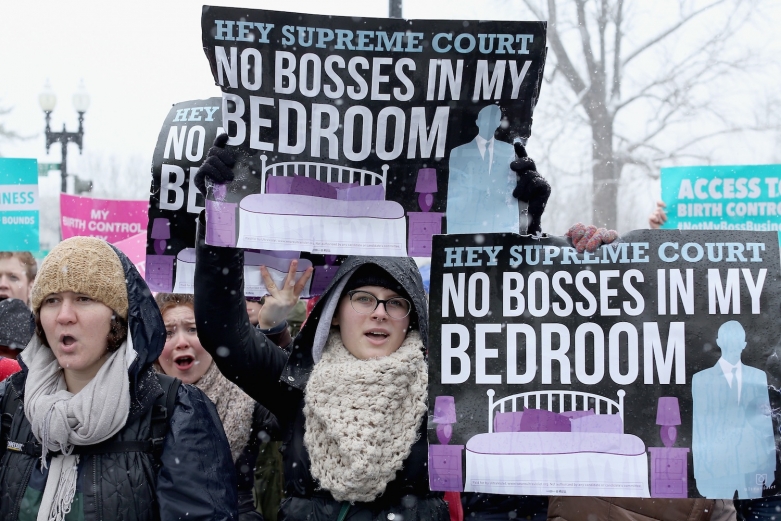Claiming a Religious Right to Discriminate: How the Hobby Lobby Case Impedes Social Progress
Page Media

At the ACLU, we frequently see historic civil liberties battles recurring in new guises. The cases on contraceptive coverage in employee health plans argued before the Supreme Court last week present a familiar scenario: in times of rapid social progress, those resisting equality claim a religious right to discriminate.
- In the 1960s, restaurant owners claimed that civil rights laws infringed their deeply held religious views against racial integration.
- In the 1970s, employers refused to give women equal pay or benefits, arguing that they could not be complicit in violating the Biblical edict that men must be heads of households.
- In the 1980s, a university challenged the revocation of its tax exempt status because of its religiously-based ban on interracial dating.
The courts easily rejected all of these claims. Companies do not have a religious right to discriminate when they hire workers and open their doors to the public. That principle should dispose of the birth control cases: eliminating coverage for contraception in employee health plans is sex discrimination. The federal mandate is designed to protect women’s health and equality, for access to contraception is as important to women’s equal participation in the workplace as education. The for-profit corporations claiming religious rights to disobey that law are just resurrecting the same old reactionary right to discriminate that has been repeatedly dismissed.
That’s why it was startling to see the Supreme Court give the corporations a respectful reception. More accurately, men on the Court expressed concern for the religious rights of the business owners. The women on the Court grilled their lawyer about the steep slippery slope the companies were asking the Court to approve: if these for-profit companies prevailed, what prevented other corporations from denying workers insurance for vaccinations or blood transfusions? There is no principled distinction between contraception (one of the most important public health achievements of the 20th century, according to the Centers for Disease Control) and other medical care.
The companies’ lawyer asserted that future courts can be trusted to distinguish contraception from other (legitimate) forms of health care. While unwilling to sanction an employer’s wholesale meddling in its workers’ health care, the attorney insisted on the company’s right to select the morally correct methods of contraception to insure.
Birth control, plainly, is still viewed as different from health care. But if contraception is something different--“women’s business” (if not women’s mischief)--why is it any of the bosses’ business? Why is the employer’s religion burdened by something an employee buys or uses?
We cherish religious liberty at the ACLU. We understand that it is a deeply personal matter. We believe that protection of religious freedom is critical to minority faiths, which do not have the political clout to lobby for exemptions from laws that may violate their deepest convictions. We have gone to court on behalf of children expelled from public schools and workers fired from their jobs for wearing sacred symbols.
In the contraception cases before the Supreme Court, religious freedom is in danger—the workers’ religious liberty. Decisions about pregnancy, sex, and birth control implicate the deepest moral convictions of the employee who uses health insurance to obtain access to contraception—not the company that purchases it. Even accepting the dubious proposition that a corporation has a religion (and how that can be ascertained if the owners have differing faiths is one of the interesting questions raised by corporate law scholars), why should the employer be allowed to impose its religion on the workers? Is anything less the bosses’ legitimate business than what contraceptive an employee uses?
Maggie Crosby is a staff attorney with the ACLU of Northern California.
